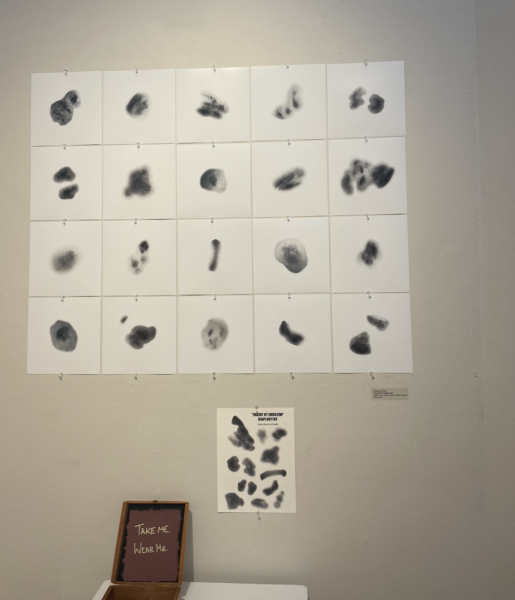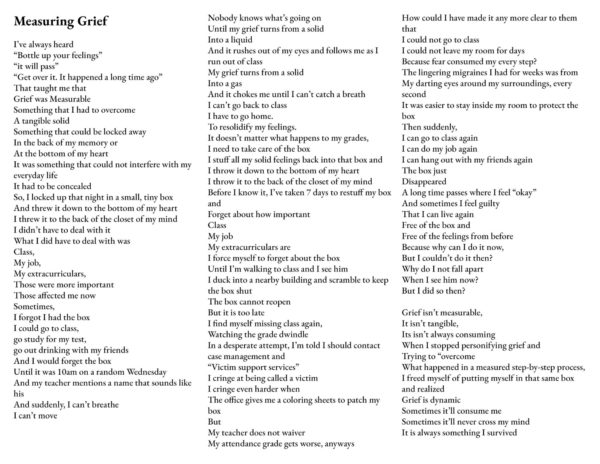
Content warning: This article discusses general themes of sexual violence.
In Tulane University’s 2022 Sexual Misconduct Climate Survey, over one in four women reported being raped since enrolling at Tulane — a slight improvement from the rate of two in five that put the university in national headlines only four years ago. It is important to note that this survey is self-reported and likely understates the real number of survivors on Tulane’s campus. While the percentage of students who have been raped is extremely high, sexual assault still feels incredibly isolating. Masked Violence Volume II provides an opportunity for survivors and loved ones to share their stories within an inclusive, safe environment.
The response and aftermath of sexual violence is deeply personal for survivors. Those who have never experienced sexual violence may never be able to fully comprehend or understand the damage and pain of sexual violence, but Masked Violence provides new insight. Masked Violence allows viewers to see what survivorship looks like as well as promotes compassion and trauma-informed care. Understanding allows students to help comfort and support their friends and peers who are survivors.
The first show in the Masked Violence series, intending to create safe and meaningful dialogue about sexual violence and survivorship, opened in March 2022. The second volume hopes to continue and advance the discussion created in 2022. Tulane students spearheaded both events, which reflect their personal work rather than work completed through the university. Tulane alumni and local residents, hoping to center survivor voices, also created artwork and written work for the space. Masked Violence also gave artists the option to contribute anonymously.
One of Masked Violence’s artists and organizers, Magdalena Saliba, featured a work titled “Welcome to Tulane.” The piece includes 16 digital images of different shaped bruises as well as an interactive portion that prompts viewers to take and wear a temporary tattoo that resembles a bruise.
“In my opinion, visiting Masked Violence really is important for two reasons … first is that it is a truly validating experience for anyone who is a survivor of sexual violence. It’s a reminder that healing comes in all forms and takes time. My second reason which was why I made art this year is that visiting masked violence is a huge act of solidarity and action to call out Tulane for silencing so many survivors over the years,” Saliba said.

The idea that Tulane has not created a thoughtful, caring environment for survivors is echoed in the anonymous piece entitled “Measuring Grief.” The author beautifully describes Tulane’s inadequate response to their assault: the school gave them a coloring sheet, yet no support for how sexual assault affected their academic performance.
This exhibition is painfully needed on Tulane’s campus, where sexual violence is repeatedly swept under the rug. Many students on Tulane’s campus feel that sexual violence is commonplace and that perpetrators do not face any consequences. While Masked Violence does not bring perpetrators to justice, the exhibition offers a space for survivors to feel supported and heard. The show reminds survivors that they are not as alone as they may feel.
On a campus where sexual assault is prevalent, the exhibit is not only important for the solidarity of survivors, but can serve as a powerful teaching tool for all students. Most Tulane students will know someone who is raped during their time at Tulane; Masked Violence can help students — who may not have experienced sexual assault — conceptualize and bear witness to the tangible damage assault creates. The show is a meaningful reminder of what consent is: enthusiastic and explicit.
Tulane needs spaces such as Masked Violence to provide community and support for survivors, as well as increased knowledge and awareness for students. The Tulane students spearheading this effort exemplify courage and openness, and all Tulane students should show support for their bravery and honest effort to empower survivors.
The show runs until Oct. 20 in the Carroll Gallery in the Woldenberg Art Center. It is a must see for all members of the Tulane community.



Leave a Comment